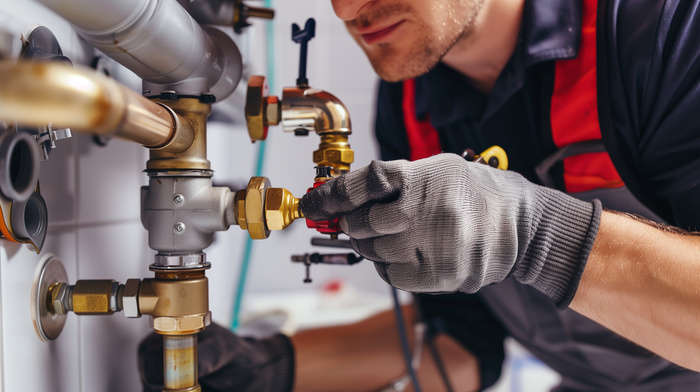
Let’s face it—plumbing isn’t something we usually think about until there’s an issue. But keeping up with basic plumbing system maintenance tips can help us prevent costly breakdowns, conserve water, and avoid major headaches. At Gator Plumbing, we’ve seen how a little proactive care goes a long way. That’s why we’re sharing tried-and-true tips to help homeowners stay ahead of common issues and keep their systems in top shape all year round.
Understanding the Basics of Your Plumbing System
Before diving into detailed plumbing system maintenance tips, it helps to understand the essential components of your home’s plumbing.
Key Components of a Plumbing System
- Water Supply Lines: These pipes bring fresh water into your home from a municipal source or a private well.
- Drainage System: This part of the system removes wastewater from your home, directing it to a sewer or septic tank.
- Fixtures: Sinks, toilets, showers, and appliances like dishwashers and washing machines that use water.
- Valves: Control the flow of water throughout the system.
Regular Inspection and Maintenance
One of the most valuable plumbing system maintenance tips is to inspect your system regularly. Monthly and annual check-ins help catch small issues before they become big ones.
Monthly Checks
- Inspect for Leaks: Check under sinks, around toilets, and near appliances for any signs of leaks. Even small drips can lead to larger issues over time.
- Test Water Pressure: Low water pressure can indicate a problem within your plumbing system, such as a leak or blockage.
- Examine Water Heater: Look for any signs of rust or leaking around the tank, and ensure the temperature is set between 120-140 degrees Fahrenheit for optimal efficiency.
Annual Maintenance
Being proactive with your plumbing helps you avoid emergencies. Here are simple but powerful plumbing system maintenance tips that go a long way.
- Flush Water Heater: Sediment can build up in the tank, reducing efficiency and lifespan. Flushing your water heater once a year can prevent this.
- Inspect Sewer Lines: If you have a sewer line, consider having it inspected with a camera to check for blockages or damage.
- Check Septic System: If your home uses a septic system, regular pumping and inspection are crucial for preventing backups and failures.
Preventative Measures
Prevention is always better than cure, especially when it comes to plumbing. By implementing a few preventative measures, you can avoid common plumbing issues:
Proper Use of Drains
- Avoid Pouring Grease: Grease can solidify and block pipes, leading to clogs. Instead, dispose of grease in a container and throw it away.
- Use Drain Screens: Install screens in sinks and showers to catch hair, food particles, and other debris.
- Be Mindful of What You Flush: Only flush toilet paper and human waste. Items like wipes and sanitary products can cause blockages.
Protecting Pipes from Damage
- Insulate Pipes: In colder climates, insulating pipes can prevent them from freezing and bursting during winter months.
- Avoid Using Chemical Drain Cleaners: These can erode pipes over time. Opt for mechanical methods like plungers or plumber’s snakes for clearing clogs.
Signs of Plumbing Problems
Recognizing the early signs of plumbing problems can save you from more serious issues down the line. Here are some common warning signs:
Unusual Noises
If you hear banging, gurgling, or other strange noises coming from your pipes, it may indicate air in the system or a blockage that needs attention.
Slow Drains
Slow-draining sinks or tubs can signal a clog in the pipes. Addressing these issues early can prevent complete blockages.
Water Discoloration
Brown or yellow water can indicate rust in your pipes or a problem with your water heater. It’s essential to address this issue promptly to maintain water quality.
When to Call a Professional
While regular maintenance can prevent many issues, some problems require professional expertise. Here are situations where it’s best to call in experts like Gator Plumbing:
Persistent Leaks
If you’ve tried to fix a leak, but it keeps returning, a professional plumber can diagnose and repair the issue more effectively.
Major Water Damage
Signs of extensive water damage, such as mold growth or structural damage, require immediate professional intervention to prevent further issues.
Sewer Line Issues
Problems with your sewer line, like frequent backups or foul odors, are best handled by professionals who have the tools and expertise to address them.
Staying on top of plumbing system maintenance tips doesn’t require a lot of time—but it does require consistency. With regular inspections, a few smart habits, and professional support when needed, we can keep our homes running smoothly. At Gator Plumbing, we’re proud to help Florida homeowners maintain systems that work as hard as they do.
If you’re ready to get serious about your plumbing care, reach out to Gator Plumbing to schedule an inspection or consultation today. Prevent problems before they start—and save yourself the hassle later.



